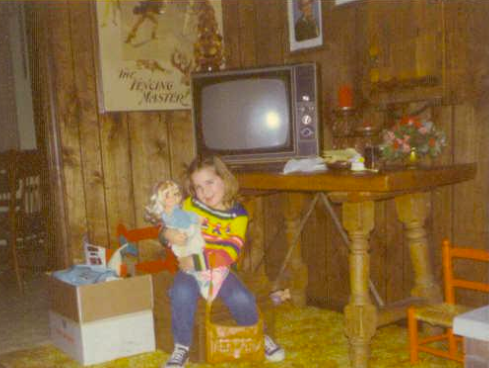Is It Wrong to Want to Give Your Children What You Never Had?
by Kelley Dennings | December 16, 2019

Like many kids, my childhood memories of Christmas are of opening presents stacked under the tree—ones from Santa, my parents, and even my sister.
I didn't usually get the hot new toy or the brand-name version, but there was always something for each of us. Making sure there was a present or two to unwrap was important for my parents. They had both grown up with very little, so they wanted their children to have what they never did.
This feeling is natural for parents, and they shouldn’t be faulted for it. But it’s what makes questioning consumption so important, yet difficult.
For my parents, fulfilling their desire to have presents under the tree was easy because my dad worked in retail. In fact, it was maybe too easy. For a short time he even ran a year-round Christmas store.
This was before the existence of Black Friday as we know it today. My parents didn't go into debt to purchase our Christmas presents because they were frugal. They hunted for deals year-round and stored our goodies where we wouldn’t find them.
My dad was raised knowing the value of money and what it was like to go without. When something went on sale, he bought it. Sometimes he bought a lot of one thing.
When televisions (the little black and white versions we had back in the ‘80s) were on sale, my dad couldn't help himself. He bought one for each room. I was one of the few kids with a TV in my bedroom.
Flash forward 35 years.
A lot of my parents’ experiences and values stuck with me. I still walk right through a store to the back where the sales racks are. But as my own experiences and values developed through the years, my holiday traditions have changed. I spend a lot less time in stores. It’s hard for me not to think about all the fossil fuels, trees, and other natural resources that go into producing toys, clothes, electronics, and wrapping paper used this time of year.
Overconsumption, after all, is inflicting devastation on our natural world. It’s one reason why more than 1 in 4 species of animals and plants just assessed by the International Union for the Conservation of Nature are facing extinction.

My Christmas now includes very few material gifts. If I do purchase or receive gifts, they are often experiences, food and treats, and donations to charity, among other things.
As the child of parents who worked so hard to give me what they didn't have, I wonder what my dad would think about me now denouncing consumerism, materialism, and shopping. I’d like to think he would be supportive if he was still around.
Thankfully my mom has embraced my holiday wishes, and I’m grateful for it. She sees that you can't find happiness through stuff, but I know it wasn't easy for her to let go of my family's retail roots this time of year.
Granted, I don’t have children of my own. But I have a niece, nephews, and a best friend with children that I see over the winter holidays. It is hard even for me to make their holiday memories less about what’s under the tree and more about experiencing time together. Going against such a strong social norm is not easy—especially for those holiday rituals involving children.
Changing family holiday traditions doesn’t mean you have to stop giving your loved ones gifts. It’s more about seeking meaningful alternatives that are friendly to our communities and the planet to show how we love and spend time with each other. And often these alternatives are more memorable, unique, and economical than mass-produced items found in big-box stores.
""Changing family holiday traditions doesn’t mean you have to stop giving your loved ones gifts. It’s more about seeking meaningful alternatives that are friendly to our communities and the planet to show how we love and spend time with each other."
If you’re looking for alternatives to traditional holiday gifts this year, check out Simplify the Holidays information on New Dream’s site or the Center for Biological Diversity’s site. You can listen to stories like this one on the Art of Allowance podcast, where I am joined by New Dream's Guinevere Higgins as we share ways to shift the holiday focus from things to experiences and rituals.
Kelley Dennings is a former New Dream fellow and now serves on New Dream’s Advisory Council. She works at the Center for Biological Diversity where she highlights the connections between human population growth and overconsumption and their threat to endangered species and wild places. Before joining the Center, she worked in waste reduction and forest conservation. She holds a bachelor’s degree in natural resources from N.C. State and a master’s degree in public health from the University of South Florida.

